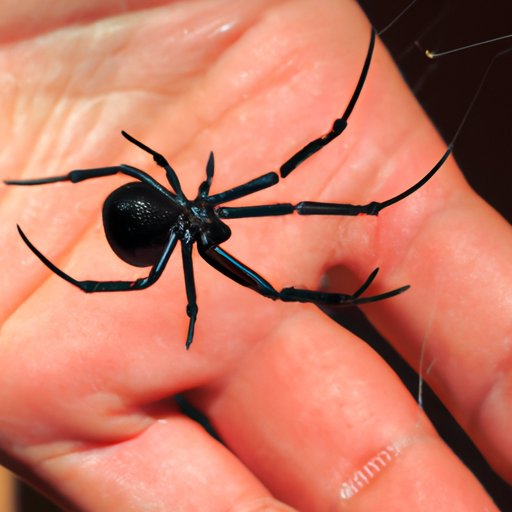
Introduction
Black widow spider bites are a serious matter that requires immediate medical attention. These spiders are known for their beautiful, shiny black bodies and distinctive red hourglass marking on their abdomen. Unfortunately, their venom is highly toxic and can lead to serious health problems if not treated promptly. In this article, we’ll explore what happens if you get bitten by a black widow, how to prevent bites, and what you need to know about their venomous bite.
Bitten by a Black Widow: Symptoms, Treatment, and Prevention
Symptoms of black widow spider bites can vary, but most people experience pain and swelling at the bite site. Other symptoms may include muscle cramps, nausea, and fatigue. In some cases, the bite may cause more serious symptoms such as fever, difficulty breathing, and seizures. If you suspect that you’ve been bitten by a black widow, seek emergency medical attention immediately.
Before medical help arrives, there are steps you can take to care for the bite. Use a clean, damp cloth to clean the bite site and apply a cold compress to reduce swelling. Avoid tight clothing or jewelry around the bite site. Additionally, over-the-counter pain relievers may help relieve pain and discomfort.
In terms of treatment, medical professionals may administer antivenom to counter the effects of the venom. Pain medication may also be prescribed. It’s important to note that the severity of the bite and its symptoms will determine the course of treatment.
To prevent black widow spider bites, it’s important to understand where these spiders are most commonly found. Black widows prefer dark, secluded areas such as sheds, garages, and woodpiles. Be sure to wear gloves and long sleeves when working in these types of environments. Additionally, be sure to check any outdoor gear or clothing that has been stored in these areas prior to use.
Surviving a Black Widow Bite: A Personal Account
Surviving a black widow bite can be a scary and potentially dangerous experience. One personal account comes from a woman who was camping in the desert and was bitten by a black widow. Initially, she felt a sharp pain at the bite site followed by muscle spasms and cramps in her extremities.
She was able to seek medical attention quickly, receiving antivenom and pain medication to manage her symptoms. After several days of rest and recovery, she was able to return to her normal activities.
The Venomous Bite of a Black Widow Spider: What You Need to Know
Black widow spiders are found in many parts of the world and are known for their venomous bites. Their bite is designed to paralyze their prey and begins by injecting a small amount of neurotoxin into the victim. The venom then spreads through the victim’s bloodstream, causing intense pain and sometimes fatal results.
The venom from a black widow bite affects the nervous system, causing muscle cramps, tremors, and spasms. If left untreated, these symptoms can spread, leading to more severe reactions such as seizures or even death.
Why Black Widow Bites Are So Dangerous and How to Protect Yourself
Black widow spider bites are especially dangerous because they contain a potent neurotoxic venom that can quickly affect the nervous system. The venom can also spread rapidly throughout the body, leading to severe reactions. Children, the elderly, and those with weakened immune systems are particularly susceptible to the venom’s effects.
It’s important to protect yourself from black widow spider bites by keeping your surroundings clean and free of clutter. Wear protective clothing when working outside in areas where black widows are commonly found. Additionally, be sure to shake out any outdoor gear and clothing before use to ensure that a spider hasn’t taken up residence.
Black Widow Spider Bites: Myths vs. Facts and How to Handle Them
There are many myths surrounding black widow spider bites. One common myth is that the bites are always fatal. While it is true that black widow venom can be dangerous, it is rare for a bite to result in death.
Another myth is that black widow spiders are aggressive and attack without provocation. In reality, these spiders are relatively shy and only bite when they feel threatened. To handle a black widow bite, it’s important to seek emergency medical attention and to follow the advice of your healthcare provider.
Conclusion
Black widow spider bites are a serious matter that require prompt medical attention. Symptoms can vary but may include muscle cramps, pain at the bite site, and nausea. To prevent bites, keep your surroundings clean and avoid working in areas that may be inhabited by black widow spiders. Remember, if you think you’ve been bitten by a black widow, seek emergency medical attention right away.




